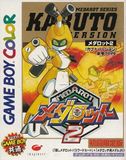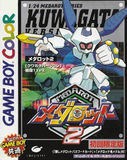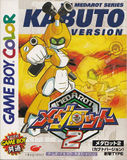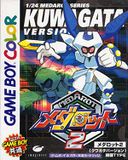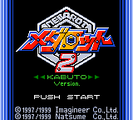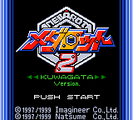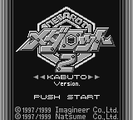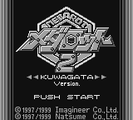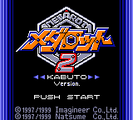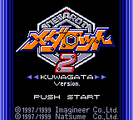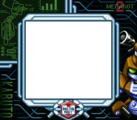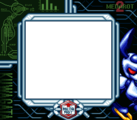Medarot 2: Difference between revisions
(→Screen) |
(→Screen) |
||
| Line 73: | Line 73: | ||
File:Medarot 2 (Kabuto) Title Screen.png|Title Screen (Kabuto) | File:Medarot 2 (Kabuto) Title Screen.png|Title Screen (Kabuto) | ||
File:Medarot 2 (Kuwagata) Title Screen.png|Title Screen (Kuwagata) | File:Medarot 2 (Kuwagata) Title Screen.png|Title Screen (Kuwagata) | ||
File:Medarot 2 (Kabuto) Title Screen (Game Boy).png|Title Screen (Kabuto) Game Boy | |||
File:Medarot 2 (Kuwagata) Title Screen (Game Boy).png|Title Screen (Kuwagata) Game Boy | |||
</gallery> | |||
<gallery widths=144px> | |||
File:Medarot 2 (Kabuto) Title Screen (SGB Downgrade Color).png|Title Screen (Kabuto) Super Game Boy | File:Medarot 2 (Kabuto) Title Screen (SGB Downgrade Color).png|Title Screen (Kabuto) Super Game Boy | ||
File:Medarot 2 (Kuwagata) Title Screen (SGB Downgrade Color).png|Title Screen (Kuwagata) Super Game Boy | File:Medarot 2 (Kuwagata) Title Screen (SGB Downgrade Color).png|Title Screen (Kuwagata) Super Game Boy | ||
Revision as of 23:05, 29 July 2024
| Medarot 2 メダロット2 | |
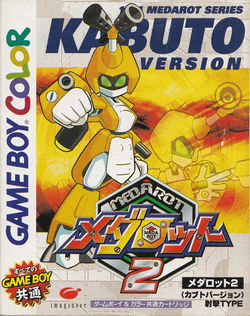
| |
| Genre | RPG |
|---|---|
| Platform | Game Boy / GBC |
| Developer | Natsume |
| Publisher | Imagineer |
| Release Date | July 23, 1999 |
Medarot 2 was released in 1999 for the Nintendo Game Boy. It's a direct sequel to Medarot 1, and follows the first adventures of Ikki Tenryou and his friends in the town of Omikuji. Unlike its predecessor, Medarot 2 can be played in full color on a Game Boy Color.
Like the other RPGs, the game was released in two versions where the main difference is the player's starting Medarot: Kabuto (Rhinoceros beetle, Metabee) and Kuwagata (Stag beetle, Rokusho). Along with the starting Medarots, there are some Medarots and Medals that can only be obtained in a specific version.
A remake of the game for Game Boy Advance, titled Medarot 2 Core, was released in 2002. While the remake saw releases in North America and Europe, the original Game Boy version of Medarot 2 has never been translated into English.
Selection of Medarots
- Main article: Medarots in Medarot 2
There were 91 new Medarots created for Medarot 2. The game also contains the 60 Medarots from Medarot 1, bringing the grand total up to 151. (The Medarots from the first game must be transferred from a copy of Medarot 1 after beating the game.)
System
In addition to being the first Medarot game in color, Medarot 2 has better graphics and several new features added. It's also backwards compatible with Medarot 1 after clearing the story.
The game is compatible with the Super Gameboy, featuring special borders similar to the previous game. However, the color palette is more limited compared to playing on a Game Boy Color. It's not normally possible to play with both the SGB border and GBC color palette simultaneously.
New features
- Medaforce
- New attacks
- Medal natures
- Auto-battle feature
Other changes
- People now have face sprites when talking
- Changes to some Medals
- Some attack mechanics have changed
- You can no longer set the battle animation speed, but it's faster than in Medarot 1
Continuity and Placement
The game takes place 13 years after Medarot 1.
Development
- Main article: Hirano Kana's Medarot 2 Production Notes
While the original Medarot only had three developers assigned to it, Medarot had much greater time and ressources invested into it due to the increased amount of content and more ambitious scenario. Hirano Kana initially wrote a "phantom script" with a story completely different of that of the final game, but had to scrap it when a production meeting lead to the setting being overhauled. After the first game had characters named after rice, it was decided that the cast of Medarot 2 should following a naming theme of beer and spirits.
Limited edition release
Limited editions of both versions of the game were released at the same time as the normal editions. The limited versions contained a random plastic Medal for use with the toy Medarotch, and a card listing the passwords to obtain the parts for Rappy in-game. The only difference was the extras in the box, and both editions contained the exact same game cartridge.
Both versions are still readily available second-hand, but it's common for limited editions to be missing their extras. The limited edition box art can be distinguished from the normal edition by a block of gold (Kabuto) or silver (Kuwagata) color behind the English title, as well as the Japanese text for "first edition" (初回限定版) near the bottom of the picture.
Gallery
Box art
-
Kabuto version (Limited edition)
-
Kuwagata version (Limited edition)
-
Kabuto version (Normal edition)
-
Kuwagata version (Normal edition)
Screen
-
Title Screen (Kabuto)
-
Title Screen (Kuwagata)
-
Title Screen (Kabuto) Game Boy
-
Title Screen (Kuwagata) Game Boy
-
Title Screen (Kabuto) Super Game Boy
-
Title Screen (Kuwagata) Super Game Boy
-
Super Game Boy Border (Kabuto)
-
Super Game Boy Border (Kuwagata)
See also
| Video Games View - Edit | |
|---|---|
| Main series / Parts Collections |
Medarot 1 (PC / PC2) - Medarot 2 (PC) - Medarot R (PC) - Medarot 3 (PC) - Medarot 4 Medarot 5 - Medarot DS - Medarot 7 - Medarot 8 - Medarot 9 |
| Side games | Medarot Navi - Shingata Medarot - Medarot S: Unlimited Nova |
| Remakes | Medarot Perfect Edition - Medarot 2 Core |
| Action games | Metabee Shot - Medarot G - Medabots AX - Medarot Brave - Medarot Dual - Medarot Girls Mission |
| Collections | Medarot Classics - Medarot Classics Plus |
| Other games | Medarot Cardrobottle - Pocket Robottle - Robattle 3D - Medarotch |
